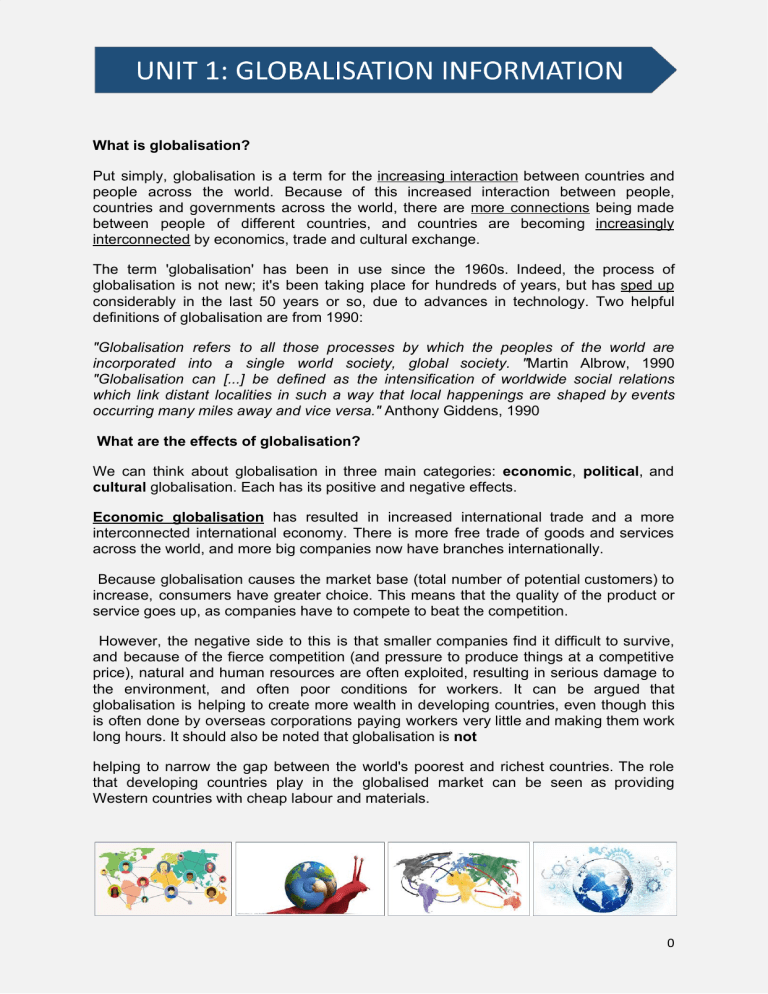
What is globalisation? Put simply, globalisation is a term for the increasing interaction between countries and people across the world. Because of this increased interaction between people, countries and governments across the world, there are more connections being made between people of different countries, and countries are becoming increasingly interconnected by economics, trade and cultural exchange. The term 'globalisation' has been in use since the 1960s. Indeed, the process of globalisation is not new; it's been taking place for hundreds of years, but has sped up considerably in the last 50 years or so, due to advances in technology. Two helpful definitions of globalisation are from 1990: "Globalisation refers to all those processes by which the peoples of the world are incorporated into a single world society, global society. "Martin Albrow, 1990 "Globalisation can [...] be defined as the intensification of worldwide social relations which link distant localities in such a way that local happenings are shaped by events occurring many miles away and vice versa." Anthony Giddens, 1990 What are the effects of globalisation? We can think about globalisation in three main categories: economic, political, and cultural globalisation. Each has its positive and negative effects. Economic globalisation has resulted in increased international trade and a more interconnected international economy. There is more free trade of goods and services across the world, and more big companies now have branches internationally. Because globalisation causes the market base (total number of potential customers) to increase, consumers have greater choice. This means that the quality of the product or service goes up, as companies have to compete to beat the competition. However, the negative side to this is that smaller companies find it difficult to survive, and because of the fierce competition (and pressure to produce things at a competitive price), natural and human resources are often exploited, resulting in serious damage to the environment, and often poor conditions for workers. It can be argued that globalisation is helping to create more wealth in developing countries, even though this is often done by overseas corporations paying workers very little and making them work long hours. It should also be noted that globalisation is not helping to narrow the gap between the world's poorest and richest countries. The role that developing countries play in the globalised market can be seen as providing Western countries with cheap labour and materials. 0 Political globalisation is when governments or states form part of international bodies or organisations, such as the European Union, or the United Nations. This can be beneficial as large international organisations can focus on human rights, environmental issues and other matters of global concern (for example, the UN created a charter of human rights, and is also responsible for the Paris Agreement, which is designed to combat the effects of climate change on the planet). This can in turn ensure the improvement of citizens' lives, and create harmony between countries who share membership in the same international organisation. In this way, political globalisation can be said to promote political stability. It is also vital for countries to act together when tackling issues like climate change, which require a response from all countries, not just individual ones. However, some negative effects of political globalisation can include the lack of sovereignty felt by some citizens of a country, as well as some countries being seen to dominate the international political scene: for example, the UN has only five permanent member countries (China, France, Russian Federation, United Kingdom, United States). Some people may view globalisation as responsible for wars, since a great many wars have been the result of the global expansion of empires and attempts to control resources. Cultural globalization refers to the exchange of ideas, information, attitudes and values around the world. These ideas, information, attitudes and values are spread using the Internet, popular culture media, and international travel. This is a good thing because people can experience foods, clothing and other products that weren't previously available in their countries. They can also enjoy different films, art, music, and philosophical ideas from other parts of the world. As well as this, globalisation has made people more aware of events that are happening in different parts of the world (for example, natural disasters such as tsunamis and earthquakes). As a result, people are more informed and more mobilised to be able to help others in different countries. However, while cultural globalisation can result in cultural enrichment, it can also cause cultural degradation. For example, some cultures can become drowned out by more dominant cultures, which is a threat to the world's cultural diversity. Languages, traditions and region identity can become lost, while the dominant cultures can take over the local cultures of a country. There is also a growing concern about terrorism and diseases being able to spread more easily because of cultural globalisation. Resource credit: unknown source. 1


